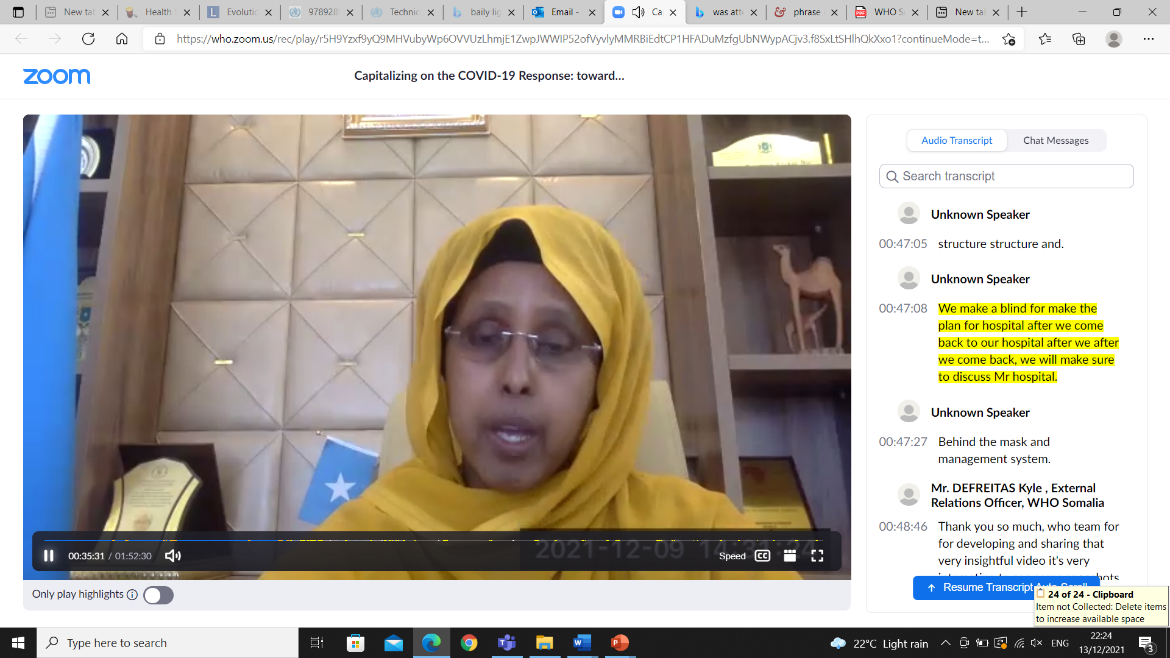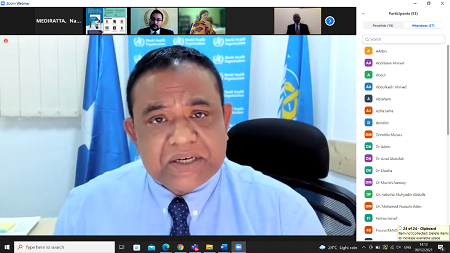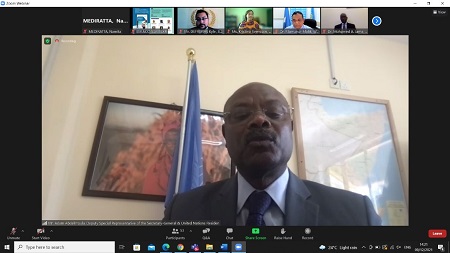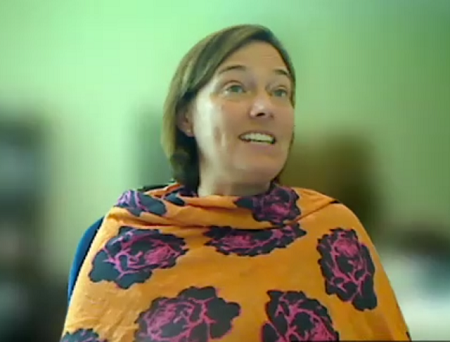14 December 2021 – On 9 December 2021, the World Health Organization (WHO) country office for Somalia officially launched a report entitled ‘Capitalizing on the COVID-19 response: towards establishing emergency, critical and operative care services in a fragile setting.’ Led by the WHO Representative to Somalia, Dr Mamunur Malik, this official launch was attended by other dignitaries, including: the Federal Minister of Health and Human Services of Somalia HE Dr Fawziya Abikar Nur; the Deputy Special Representative of the Secretary-General and United Nations Resident and Humanitarian Coordinator for Somalia Mr Adam Abdelmoula; and the World Bank Country Manager for Somalia Ms Kristina Svensson. The launch was followed by a webinar to stimulate rich discussions around opportunities to build a stronger and resilient health system in Somalia, through the lens of emergency, critical and operative care services in a fragile setting.
High-level participants engage in stimulating discussions
 HE Dr Fawziya Abikar Nur, the Federal Health Minister explained how the activities conducted for COVID-19 would build and strengthen a resilient health system in the countryThe high-level participants delivered opening remarks to set the tone and stage for the webinar. During her opening remarks, HE Dr Fawziya Abikar Nur said, “One of the important lessons that we all learned during the COVID-19 pandemic is that it is imperative to invest in all components and levels of health system, not only on primary level care alone. Through the support received from the World Bank and WHO, a series of activities were implemented to improve access of Somalis to good quality emergency and critical care services. The outcomes of these activities will help build sustainable emergency care services for all medical and surgical conditions.”
HE Dr Fawziya Abikar Nur, the Federal Health Minister explained how the activities conducted for COVID-19 would build and strengthen a resilient health system in the countryThe high-level participants delivered opening remarks to set the tone and stage for the webinar. During her opening remarks, HE Dr Fawziya Abikar Nur said, “One of the important lessons that we all learned during the COVID-19 pandemic is that it is imperative to invest in all components and levels of health system, not only on primary level care alone. Through the support received from the World Bank and WHO, a series of activities were implemented to improve access of Somalis to good quality emergency and critical care services. The outcomes of these activities will help build sustainable emergency care services for all medical and surgical conditions.”
She added that a hospital assessment conducted as part of these activities will offer evidence for informed decision-making, as stakeholders will better understand the emergency, critical and operative care services situation in the country, in efforts to build a long-term strategy to strengthen emergency care services and integrate them into primary and secondary levels of care, while advancing towards universal health coverage (UHC).
 Dr Mamunur Rahman Malik, WHO Representative and Head of Mission to Somalia, explained the need for critical care in Somalia drawing evidence from recent studies The WHO Representative and Head of Mission to Somalia, Dr Mamunur Malik, reiterated a key lesson learnt from the COVID-19 response in Somalia, saying, “Patients receiving simple medical oxygen were up to 5 times more likely to survive than those who were on a ventilator. This shows the dire need for critical care support and services in all settings, including fragile ones. These services need to be affordable, sustainable, delivered within the ‘golden hour’, aligned with national health priorities, and rapidly implementable to a large scale to reduce preventable deaths and suffering.”
Dr Mamunur Rahman Malik, WHO Representative and Head of Mission to Somalia, explained the need for critical care in Somalia drawing evidence from recent studies The WHO Representative and Head of Mission to Somalia, Dr Mamunur Malik, reiterated a key lesson learnt from the COVID-19 response in Somalia, saying, “Patients receiving simple medical oxygen were up to 5 times more likely to survive than those who were on a ventilator. This shows the dire need for critical care support and services in all settings, including fragile ones. These services need to be affordable, sustainable, delivered within the ‘golden hour’, aligned with national health priorities, and rapidly implementable to a large scale to reduce preventable deaths and suffering.”
While reaffirming the United Nations’ support to the Somali health system and WHO in their endeavours, Mr Abdelmoula, Deputy Special Representative of the Secretary-General and United Nations Resident and Humanitarian Coordinator for Somalia, emphasized the importance of emergency care in Somalia.
 Mr Adam Abdelmoula, Deputy Special Representative of the Secretary-General and United Nations Resident and Humanitarian Coordinator stressed how the COVID-19 pandemic has shown the importance of critical care services He said that, “The COVID-19 pandemic has revealed that emergency care is critical to the achievement of UHC. Emergency care serves as a safety net and last resort for people with life-threatening health conditions who cannot be treated at the primary care level.”
Mr Adam Abdelmoula, Deputy Special Representative of the Secretary-General and United Nations Resident and Humanitarian Coordinator stressed how the COVID-19 pandemic has shown the importance of critical care services He said that, “The COVID-19 pandemic has revealed that emergency care is critical to the achievement of UHC. Emergency care serves as a safety net and last resort for people with life-threatening health conditions who cannot be treated at the primary care level.”
 Ms. Kristina Svensson, the World Bank Country Manager for Somalia reiterated the World Bank’s support to Somalia“We are happy to see that the support from the World Bank’s Pandemic Emergency Financing Facility went towards the capacity-building of frontline workers, which we all have learnt in hindsight is one of the best tools to fight the pandemic. This is only the start of our support to Somalia,” said Ms Svensson, the World Bank’s Country Manager for Somalia. While describing the World Bank’s crisis recovery efforts, Ms Svensson also called on donors and agencies active in the health care sector to work on improved coordination under the leadership of the Government.
Ms. Kristina Svensson, the World Bank Country Manager for Somalia reiterated the World Bank’s support to Somalia“We are happy to see that the support from the World Bank’s Pandemic Emergency Financing Facility went towards the capacity-building of frontline workers, which we all have learnt in hindsight is one of the best tools to fight the pandemic. This is only the start of our support to Somalia,” said Ms Svensson, the World Bank’s Country Manager for Somalia. While describing the World Bank’s crisis recovery efforts, Ms Svensson also called on donors and agencies active in the health care sector to work on improved coordination under the leadership of the Government.
Panel session on developing and sustaining emergency, critical and operative care services in Somalia
Following the official launch of the report by Dr Mamunur Malik and handing over the report to HE Dr Fawziya Nur and Ms Svensson, the WHO’s Head of Unit for Clinical Services and Systems, Dr Teri Reynolds, explained to the audience how emergency, critical and operative care links with a health system’s goals, UHC, and the essential packages of health services, which countries such as Somalia will be rolling out soon to better ensure health for all.
Dr Mohamed Abdi Jama, Senior Policy Advisor to the Ministry of Health, Federal Government of Somalia, then led a panel discussion on developing and sustaining emergency, critical and operative care services in Somalia, with a view to achieving UHC. He engaged the panelists to hear more about their experiences and lessons learned, discussing future opportunities with regard to sustainable capacity- and institution-building in emergency, critical and operative care services.
Experts on the panel included: Mr Ibrahim Mohamed Nur, Senior Health Management Information Systems and Health System Specialist, Federal Ministry of Health of Somalia; Dr Ibrahim Hussein Ali, Emergency Medical Coordinator, Federal Ministry of Health of Somalia; Dr Bernard Olayo, Senior Health Specialist, World Bank; Dr Sara Halimah, Regional Trauma Specialist, WHO Regional Office for the Eastern Mediterranean; Dr Pryanka Relan, Technical Officer, WHO; and Dr Zainab Abdirahman Ali, a trainee and medical doctor at the Galkayo Hospital. Each shared invaluable experiences and insights with respect to their engagement and support under this project, as well as what the project has meant for improved health services across the country.
Paving the way to offer robust emergency, critical and operative care
Through these institution- and capacity-building interventions, and inclusive discussions, assessments and analysis, Somalia’s Federal Government, WHO, the World Bank and other key partners have already started to lay the foundation for robust, good quality and affordable emergency, critical and operative care that all Somalis will be able to access, both now and in the near future.


